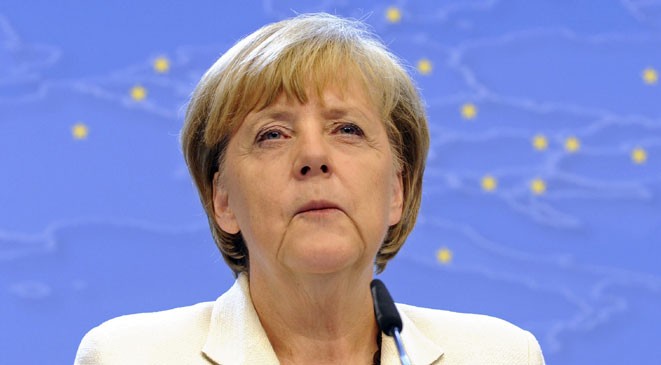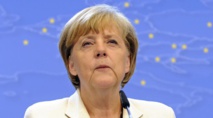Merkel's first stop in Georgia comes one decade after the August 2008 war between Russia and the former Soviet republic - a conflict triggered by the unresolved territorial dispute in which the South Ossetia region split away from Georgia. It was historic for being the first time Russia became militarily involved with a neighbouring state that was leaning toward the West.
The German chancellor's trip also comes more than 25 years since the neighbours of Armenia and Azerbaijan - likewise former Soviet republics - waged a war in 1992-1994 over the region of Nagorno-Karabakh. The region belongs to Azerbaijan but is controlled by pro-Armenian forces.
A military build-up has followed the Nagorno conflict, above all in Azerbaijan, which has a large population and a wealth of raw materials. Military spending by the country of 9 million amounted in 2015 to almost 2 billion dollars, according to the German political think tank Institute for International and Security Affairs (SWP). In 2017, amid dropping oil prices, spending dipped to 1.5 billion dollars, but President Ilham Aliyev likes to point out that since 2003, military spending has grown 15-fold.
By comparison, Armenia spent only 437 million dollars in 2017 for the military - a nevertheless considerable sum for a country with a population of 3 million. The new leadership in Erivan under Premier Nikol Pashinyan has called for peace talks with Azerbaijan.
Prior to its war with Russia ten years ago, Georgia had massively boosted its military. After the defeat, Tbilisi reined in its defence spending as Russia strongly built up the break-away regions of South Ossetia and Abkhazia. There are 4,000 Russian soldiers stationed in South Ossetia alone, which poses major conflict potential for the region.
Georgia has since the August 2008 war sought protection under the umbrella of the European Union and the western NATO alliance. Tbilisi is cooperating with NATO, including on joint military exercises, and is bolstering its military capacities. But the West has become somewhat cautious in the wake of similar developments in the Ukraine and Russia's response.
The European Union sees Georgia as a leader among the countries of the so-called eastern partnership. Since 2016, the EU has had association membership and free trade agreements with Georgia in place.
But membership in the EU and NATO is still far away. After Russian Prime Minister Dmitry Medvedev warned that Georia's NATO entry could provoke a "terrible conflict," Berlin has made it clear that Georgia is not even a candidate. Merkel is operating with caution. But for Germany and the EU, it is an economically important region.
Just how important was underscored by the row over Azerbaijan's refusal to allow German parliamentary deputy Albert Weiler to enter the country as part of Merkel's delegation after he visited the conflict region of Nagorno-Karabakh in 2014 and 2016. According to the German daily Saarbruecker Zeitung, Baku has threatened to arrest Weiler at the airport should he arrive with Merkel there on Saturday.
Rather than call off the trip entirely, Merkel opted to proceed, likely in a bid to preserve German and European interests. The EU wants Azerbaijani gas in order to reduce its dependence on Russia.
The international community, and the West in particular, had underestimated the conflict in Georgia ten years ago and reacted too late to it. Even today the region, which is a strategic outpost for Iran and Central Asia, is still not on the European Union's radar screen. Merkel's visit might change this.
The German chancellor's trip also comes more than 25 years since the neighbours of Armenia and Azerbaijan - likewise former Soviet republics - waged a war in 1992-1994 over the region of Nagorno-Karabakh. The region belongs to Azerbaijan but is controlled by pro-Armenian forces.
A military build-up has followed the Nagorno conflict, above all in Azerbaijan, which has a large population and a wealth of raw materials. Military spending by the country of 9 million amounted in 2015 to almost 2 billion dollars, according to the German political think tank Institute for International and Security Affairs (SWP). In 2017, amid dropping oil prices, spending dipped to 1.5 billion dollars, but President Ilham Aliyev likes to point out that since 2003, military spending has grown 15-fold.
By comparison, Armenia spent only 437 million dollars in 2017 for the military - a nevertheless considerable sum for a country with a population of 3 million. The new leadership in Erivan under Premier Nikol Pashinyan has called for peace talks with Azerbaijan.
Prior to its war with Russia ten years ago, Georgia had massively boosted its military. After the defeat, Tbilisi reined in its defence spending as Russia strongly built up the break-away regions of South Ossetia and Abkhazia. There are 4,000 Russian soldiers stationed in South Ossetia alone, which poses major conflict potential for the region.
Georgia has since the August 2008 war sought protection under the umbrella of the European Union and the western NATO alliance. Tbilisi is cooperating with NATO, including on joint military exercises, and is bolstering its military capacities. But the West has become somewhat cautious in the wake of similar developments in the Ukraine and Russia's response.
The European Union sees Georgia as a leader among the countries of the so-called eastern partnership. Since 2016, the EU has had association membership and free trade agreements with Georgia in place.
But membership in the EU and NATO is still far away. After Russian Prime Minister Dmitry Medvedev warned that Georia's NATO entry could provoke a "terrible conflict," Berlin has made it clear that Georgia is not even a candidate. Merkel is operating with caution. But for Germany and the EU, it is an economically important region.
Just how important was underscored by the row over Azerbaijan's refusal to allow German parliamentary deputy Albert Weiler to enter the country as part of Merkel's delegation after he visited the conflict region of Nagorno-Karabakh in 2014 and 2016. According to the German daily Saarbruecker Zeitung, Baku has threatened to arrest Weiler at the airport should he arrive with Merkel there on Saturday.
Rather than call off the trip entirely, Merkel opted to proceed, likely in a bid to preserve German and European interests. The EU wants Azerbaijani gas in order to reduce its dependence on Russia.
The international community, and the West in particular, had underestimated the conflict in Georgia ten years ago and reacted too late to it. Even today the region, which is a strategic outpost for Iran and Central Asia, is still not on the European Union's radar screen. Merkel's visit might change this.









 Home
Home Politics
Politics











